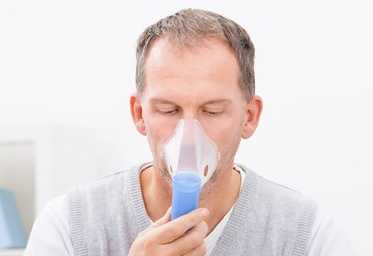Symptoms, remedies, treatments and care for Cough
Asthma
 Asthma is a respiratory condition marked by spasms in the bronchi of the lungs, causing difficulty in breathing, wheezing, breathlessness, chest tightness, and coughing. It usually results from an allergic reaction or other forms of hypersensitivity.
Asthma is a respiratory condition marked by spasms in the bronchi of the lungs, causing difficulty in breathing, wheezing, breathlessness, chest tightness, and coughing. It usually results from an allergic reaction or other forms of hypersensitivity.Asthma is one of the most common chronic childhood illnesses, but it can happen to adults too. Occupational asthma is caused by inhaling fumes, gases, dust or other potentially harmful substances while on the job.
Remedies:
3.2



 (121)
(121)



 (121)
(121)
Effectiveness: 3.2 Popularity: 121
3.4



 (109)
(109)



 (109)
(109)
Effectiveness: 3.4 Popularity: 109
2.8


 (84)
(84)


 (84)
(84)
Effectiveness: 2.8 Popularity: 84
3.6



 (81)
(81)



 (81)
(81)
Effectiveness: 3.6 Popularity: 81
3.6



 (52)
(52)



 (52)
(52)
Effectiveness: 3.6 Popularity: 52
3.2



 (26)
(26)



 (26)
(26)
Effectiveness: 3.2 Popularity: 26
3.0


 (25)
(25)


 (25)
(25)
Effectiveness: 3.0 Popularity: 25
2.2


 (24)
(24)


 (24)
(24)
Effectiveness: 2.2 Popularity: 24
0.9
 (23)
(23)
 (23)
(23)
Effectiveness: 0.9 Popularity: 23
3.4



 (21)
(21)



 (21)
(21)
Effectiveness: 3.4 Popularity: 21
3.7



 (15)
(15)



 (15)
(15)
Effectiveness: 3.7 Popularity: 15
3.8



 (12)
(12)



 (12)
(12)
Effectiveness: 3.8 Popularity: 12
2.2


 (9)
(9)


 (9)
(9)
Effectiveness: 2.2 Popularity: 9
2.6


 (6)
(6)


 (6)
(6)
Effectiveness: 2.6 Popularity: 6
1.6

 (5)
(5)

 (5)
(5)
Effectiveness: 1.6 Popularity: 5
1.0
 (2)
(2)
 (2)
(2)
Effectiveness: 1.0 Popularity: 2
1.0
 (2)
(2)
 (2)
(2)
Effectiveness: 1.0 Popularity: 2
0.0
(2)
Effectiveness: 0.0 Popularity: 2
2.0

 (1)
(1)

 (1)
(1)
Effectiveness: 2.0 Popularity: 1
Effectiveness: N/A Popularity: 0
Effectiveness: N/A Popularity: 0
COPD
 COPD (Chronic obstructive pulmonary disease) is a chronic inflammatory lung disease that causes obstructed airflow from the lungs. It's caused by long-term exposure to irritating gases or particulate matter such as cigarette smoke. Symptoms of COPD include breathing difficulty, chest tightness, cough, mucus (sputum) production and wheezing. People with COPD are at increased risk of developing heart disease, lung cancer and a variety of other conditions.
COPD (Chronic obstructive pulmonary disease) is a chronic inflammatory lung disease that causes obstructed airflow from the lungs. It's caused by long-term exposure to irritating gases or particulate matter such as cigarette smoke. Symptoms of COPD include breathing difficulty, chest tightness, cough, mucus (sputum) production and wheezing. People with COPD are at increased risk of developing heart disease, lung cancer and a variety of other conditions.Emphysema and chronic bronchitis are the two most common conditions that contribute to COPD. Emphysema is a condition in which the alveoli at the end of the smallest air passages (bronchioles) of the lungs are destroyed as a result of damaging exposure to cigarette smoke and other irritating gases and particulate matter. Chronic bronchitis is inflammation of the lining of the bronchial tubes, which carry air to and from the air sacs (alveoli) of the lungs. It's characterized by daily cough and mucus (sputum) production. Infectious diseases of the lung may damage areas of the lung tissue which also contributes to COPD.
People who smoke are at the highest risk for developing COPD. Other risk factors include exposure to secondhand smoke or air pollution, especially pollution associated with wood or coal. In addition, individuals with airway hyper-responsiveness such as those with chronic asthma are at increased risk. Other factors that may increase the risk for developing COPD include drug use, immune deficiency syndromes, vasculitis syndrome, connective tissue disorders and genetic problems.
Remedies:
3.1



 (18)
(18)



 (18)
(18)
Effectiveness: 3.1 Popularity: 18
4.3




 (15)
(15)




 (15)
(15)
Effectiveness: 4.3 Popularity: 15
3.4



 (9)
(9)



 (9)
(9)
Effectiveness: 3.4 Popularity: 9
2.8


 (8)
(8)


 (8)
(8)
Effectiveness: 2.8 Popularity: 8
3.8



 (4)
(4)



 (4)
(4)
Effectiveness: 3.8 Popularity: 4
3.6



 (4)
(4)



 (4)
(4)
Effectiveness: 3.6 Popularity: 4
3.5



 (4)
(4)



 (4)
(4)
Effectiveness: 3.5 Popularity: 4
3.4



 (2)
(2)



 (2)
(2)
Effectiveness: 3.4 Popularity: 2
2.1


 (2)
(2)


 (2)
(2)
Effectiveness: 2.1 Popularity: 2
5.0




 (1)
(1)




 (1)
(1)
Effectiveness: 5.0 Popularity: 1
Cough
 A cough is a common reflex action that clears the throat of mucus or foreign irritants. Coughing to clear the throat is typically an infrequent action, although a number of conditions can cause more frequent bouts of coughing.
A cough is a common reflex action that clears the throat of mucus or foreign irritants. Coughing to clear the throat is typically an infrequent action, although a number of conditions can cause more frequent bouts of coughing.Most cough episodes will clear up or significantly improve within two weeks. A cough that lasts between 3 and 8 weeks is a subacute cough. A persistent cough that lasts more than eight weeks is a chronic cough.
The most common cause of a cough is a respiratory tract infection, such as a cold or flu. For young children, a common cause of cough is asthma. For smokers, there can be chronic cough with a distinctive sound.
Remedies:
4.0



 (101)
(101)



 (101)
(101)
Effectiveness: 4.0 Popularity: 101
3.0


 (89)
(89)


 (89)
(89)
Effectiveness: 3.0 Popularity: 89
2.0

 (71)
(71)

 (71)
(71)
Effectiveness: 2.0 Popularity: 71
3.1



 (70)
(70)



 (70)
(70)
Effectiveness: 3.1 Popularity: 70
3.2



 (58)
(58)



 (58)
(58)
Effectiveness: 3.2 Popularity: 58
3.4



 (56)
(56)



 (56)
(56)
Effectiveness: 3.4 Popularity: 56
3.0


 (54)
(54)


 (54)
(54)
Effectiveness: 3.0 Popularity: 54
3.1



 (47)
(47)



 (47)
(47)
Effectiveness: 3.1 Popularity: 47
1.6

 (45)
(45)

 (45)
(45)
Effectiveness: 1.6 Popularity: 45
0.8
 (37)
(37)
 (37)
(37)
Effectiveness: 0.8 Popularity: 37
3.2



 (35)
(35)



 (35)
(35)
Effectiveness: 3.2 Popularity: 35
3.2



 (35)
(35)



 (35)
(35)
Effectiveness: 3.2 Popularity: 35
1.0
 (31)
(31)
 (31)
(31)
Effectiveness: 1.0 Popularity: 31
1.2

 (16)
(16)

 (16)
(16)
Effectiveness: 1.2 Popularity: 16
0.4
 (8)
(8)
 (8)
(8)
Effectiveness: 0.4 Popularity: 8
3.0


 (5)
(5)


 (5)
(5)
Effectiveness: 3.0 Popularity: 5
Cannot find information on an ailment or condition? Submit it to our system